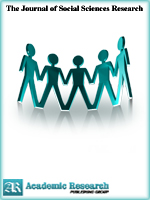The Journal of Social Sciences Research
Online ISSN: 2411-9458
Print ISSN: 2413-6670
Print ISSN: 2413-6670
Quarterly Published (4 Issues Per Year)

Archives
Volume 8 Number 2 June 2022
Pre-Emption in Jordanian Legislation: Critical Reading
Authors: Nabeel Farhan AlShatnawi ; Samir Mahmoud Abduh AlDalalah
Pages: 44-47
DOI: doi.org/10.32861/jssr.82.44.47
Abstract
The Jordanian legislator restricts the practice of pre-emption on the owned real estate in common without addressing pre-emption on movable property. This legislative approach is unwelcome, so the Jordanian legislator should have found a special legal system that controls and regulates pre-emption in movable property. This study aims to evaluate the position of the Jordanian legislator regarding pre-emption to give solutions, and to find an integrated legal system that regulates and controls pre-emption.
Meta-Analysis of Randomized Bivariate Effects of Governance on Common Resource Management
Authors: José Marcos Bustos Aguayo ; Margarita Juárez Nájera ; Cruz García Lirios
Pages: 35-43
DOI: doi.org/10.32861/jssr.82.35.43
Abstract
In the context of sustainable development, governance of water resources turns out to be a management model that would include factors relating to beliefs, attitudes, values, norms, perceptions, skills, knowledge, decisions and actions-oriented water availability and consumption of 200 standard liters per day. However, studies on the psychology of sustainability warn that availability is not only mediated cognitive dimensions but are also determined by the relationship between local authorities and users of municipal services. In this sense, the present work is proposed to specify the relationship between cognitive factors to establish a model for the study of policies tandem as an effect of the surrounding information in the media about drought, natural disasters, environmental disasters or water conflicts. To this end, a review was conducted in databases with registration ISBN and DOI considering the above constructs. Referring to the state of knowledge, the model specification was discussed.
Invisible Influence of Deities on the Culture, Art, and Lifestyle in Mangrove Forest Settlements: The Curious Case of Bonbibi
Authors: Md. Nadimuddaula
Pages: 31-34
DOI: doi.org/10.32861/jssr.82.31.34
Abstract
Stories in paintings are not only creative imaginations but often are reflections of life. Since religion and culture are two pivotal parts of human evolution, art and literature are intertwined with these two aspects of life. If we look back in history, we would observe that the Renaissance period remarkably brought and celebrated religion and religious figures in arts. This paper explores the deep convergence among art, life, religion, and culture in the settlements of the South Coastal belt of Bangladesh. This work at first brings out how religious beliefs and disbeliefs have shaped culture and art in the region. The work secondly traces the influence of culture and art in the daily lives of the people. Findings suggest that people living in coastal area have strengthened their courage based on religious beliefs, and mythical beliefs of Bonbibi (Forest Goddess), which is reflected via diverse worship-artwork and the cultural aesthetics that belongs to society. Religious beliefs also assist people to follow social standards, as a result of which a variety of laws and regulations, cultural ideals, and appropriate infrastructure for living in society are developed. Belief in Bonbibi, on the other hand, provides coastal people the bravery to roam around in everyday life and contributes to the development of culture.



